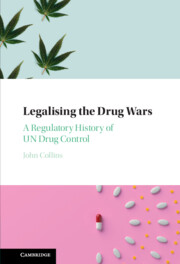Book contents
- Legalising the Drug Wars
- Legalising the Drug Wars
- Copyright page
- Dedication
- Contents
- Acknowledgements
- Abbreviations
- Historical Overview: The International Drug Control System
- Introduction
- 1 Drug Diplomacy from the Opium Wars through the League of Nations, 1839–1939
- 2 International Drug Control in Wartime, 1939–1945
- 3 Creating the UN Commission on Narcotic Drugs, 1945–1946
- 4 Reconstructing Drug Control in Europe, Asia and the Middle East
- 5 Old Battles Anew at the UN Commission on Narcotic Drugs, 1946–1948
- 6 Dividing Up the Global Licit Market, 1948–1953
- 7 From the 1953 Protocol to the 1961 Single Convention
- 8 Assessing the Legal Legacy of the Single Convention
- 9 Conclusion: UN Drug Control in the Twenty-First Century
- Notes
- Bibliography
- Index
1 - Drug Diplomacy from the Opium Wars through the League of Nations, 1839–1939
Published online by Cambridge University Press: 25 November 2021
- Legalising the Drug Wars
- Legalising the Drug Wars
- Copyright page
- Dedication
- Contents
- Acknowledgements
- Abbreviations
- Historical Overview: The International Drug Control System
- Introduction
- 1 Drug Diplomacy from the Opium Wars through the League of Nations, 1839–1939
- 2 International Drug Control in Wartime, 1939–1945
- 3 Creating the UN Commission on Narcotic Drugs, 1945–1946
- 4 Reconstructing Drug Control in Europe, Asia and the Middle East
- 5 Old Battles Anew at the UN Commission on Narcotic Drugs, 1946–1948
- 6 Dividing Up the Global Licit Market, 1948–1953
- 7 From the 1953 Protocol to the 1961 Single Convention
- 8 Assessing the Legal Legacy of the Single Convention
- 9 Conclusion: UN Drug Control in the Twenty-First Century
- Notes
- Bibliography
- Index
Summary
This chapter examines the role of the Opium Wars and great power conflict between Britain and China within the context of drug control. Within the Opium Wars, the foundational elements for the coming global drug control system were laid. These included straining bilateral relations between great powers as well as the emergence of nationalist and moralist coalitions of diplomats and missionaries driving ‘reformist’ agendas globally. The first international treaty, the 1912 International Opium Convention, aimed to create reciprocal state responsibilities for limiting the flow of mind-altering drugs. After World War I, the new multilateral drug control system was quickly absorbed by the League of Nations. However, the US’ simultaneous interest in the issue and unwillingness to join the League of Nations proved complicating. Throughout the 1920s and 1930s a whole series of treaties and institutional changes gave the system regulatory shape. The League Opium Advisory Committee, precursor to the UN Commission on Narcotic Drugs (CND) ultimately sank. The enforcement and monitoring bodies, survived and fled Geneva for the safety of Washington DC. The chapter concludes with a brief introduction to the main diplomats of the wartime era, most prominently, Harry J. Anslinger.
Keywords
- Type
- Chapter
- Information
- Legalising the Drug WarsA Regulatory History of UN Drug Control, pp. 13 - 24Publisher: Cambridge University PressPrint publication year: 2021

